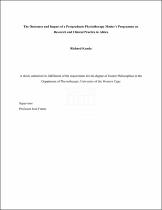| dc.description.abstract | The past decade has seen a growth in Physiotherapy schools offering postgraduate programmes in South Africa. The Republic of South Africa assists other African countries like Kenya, Malawi, Rwanda, Tanzania and Zambia in upgrading the education of diploma-trained physiotherapists (DTPs) to Bacherlor of Science (Honours) (BSc (Hons) and Master's Degrees respectively. The three institutions offering Physiotherapy training in Cape Town make it the largest training locality for Physiotherapy in South Africa. The University of Cape Town (UCT), University of the Western Cape (UWC) and Stellenbosch University are situated within a twenty kilometre radius from each other. These schools have taken a leading role in the postgraduate training of their own PTs, and those from other developing countries. In 2007, for example, about 20% of postgraduate students in Cape Town Physiotherapy schools were from other African countries. The Department of Physiotherapy at UWC in particular has been upgrading DTPs from other African countries to BSc (Hons) and Master's degrees for the last twenty years. However, compared to the wealth of educational literature on other healthcare professions, literature on the evaluation of postgraduate Physiotherapy programmes is scarce. Thus, the aim of this study was to evaluate the outcomes and impact of the UWC postgraduate Physiotherapy BSc (Hons) and Master's programme on clinical practice and research in East and Southern Africa. The dissertation used an explorative and descriptive theory-based evaluation approach using qualitative research methodology. The steps involved in the research process determined the choice and use of the qualitative methodology. The use of qualitative methods was undertaken to provide a comprehensive analysis of the research problem. The study had three main phases. Initially, administrative document reviews and in-depth interviews with UWC postgraduate Master's programme designers (PDs) were conducted to help develop and test the programme theory and measuring instruments (interview guides). Secondly, postgraduates were interviewed to establish and test the implementation process theory, as well as investigate perceived programme outcomes. Then focus group discussions with postgraduate students of UWC, and individual interviews with workplace supervisors of the UWC postgraduates were undertaken to investigate the perceived outcomes and impact of the UWC Master's programme. A variety of methods appropriate for the different steps or stages of the programme were employed, to ensure this evaluation exercise becomes an integrated function in which data are continuously collected and used for decision-making and programme improvement. Multiple types of data were collected to inform each phase. The researcher used purposive sampling technique to constitute the sample. The sampling technique yielded three official documents, three (3) PDs and two (2) implementers, 27 UWC postgraduates, seven (7) workplace supervisors and 30 students of UWC postgraduates. Data was
collected via document analyses, in-depth interviews, telephonic in-depth interviews and focus group discussions. Qualitative data analysis occurred concurrently with data collection. Atlas Ti software version 10 was used to assist with data management. The UWC postgraduates reported acquiring knowledge of manual therapy, better management of musculo-skeletal conditions and enhanced clinical reasoning. Participants also reported career growth, pursuit of higher degrees such as PhDs, promotions, job changes from physiotherapy clinicians to educators, involvement in research and the introduction of BSc programmes in their respective countries. The current study demonstrates that the primary objective of the UWC BSc (Hons) and Master's programmes such as increasing access to physiotherapy training in Africa and empowering DTPs with research skills and knowledge of community-based rehabilitation was being realised. However, many postgraduate participants in all countries emphasised the need to include basic sciences, clinical practice and specialisation in the UWC BSc (Hons) and Master's programmes respectively. Furthermore, the participants reported that the programmes did not have much impact on management of conditions other than musculo-skeletal. On the other hand, the employers that participated in the current study identified that the UWC programmes had a positive impact on Physiotherapy education in their respective countries, producing a total of five Physiotherapy degree programmes between the year 2000 and 2014. Kenya, Rwanda, Tanzania and Zambia reported introducing two, one, one and two BSc Physiotherapy programmes respectively. The study also revealed moderate research activity among UWC postgraduates, a challenge most employers attributed to institutional research agendas, high patient work-load and personal strengths of postgraduate students. The students of UWC graduates who participated in the current study reported acquiring new assessment skills for musculo-skeletal conditions, enhanced treatment techniques for musculoskeletal conditions and use of evidence to guide their clinical practice. The participants also reported reduced hospital visits among patients with musculo-skeletal conditions and relatively short treatment durations. However, in all universities but one, students indicated that most lecturers had difficulty applying basic sciences during lectures. The participants also reported a lack of specialist lecturers in areas other than musculo-skeletal. This thesis focused on evaluation of the outcomes and impact of postgraduate BSc (Hons) and Master's programmes in Physiotherapy for DTPs in SADC and East Africa. While the thesis has highlighted many achievements, it has also identified training needs of DTPs that require attention. First, we recommend that the curriculum be reviewed to incorporate clinical practice and more theoretical content in the BSc (Hons) programme and that the UWC special BSc (Hons) programme be considered an RPL project to ensure the visible (documented) and nonvisible (undocumented) knowledge claimed by applicants are subjected to a form of assessment through the UWC RPL process, thus enabling the university to identify the knowledge gap that requires bridging among DTPs seeking admission to the degree programme. Second, we recommend a review of the Master's degree by coursework programme to include more theoretical and clinical practice components that would allow for specialisation. | en_US |

